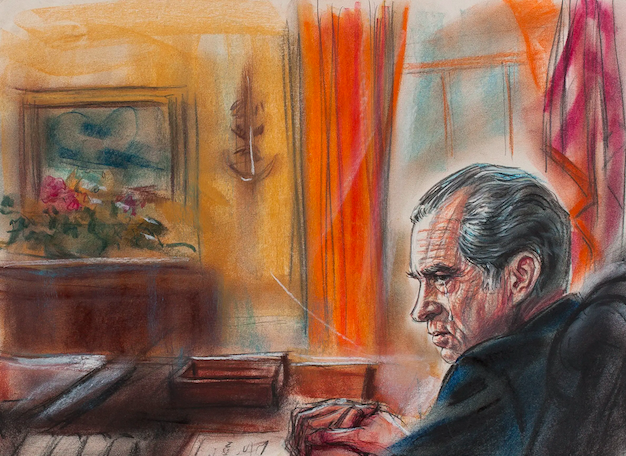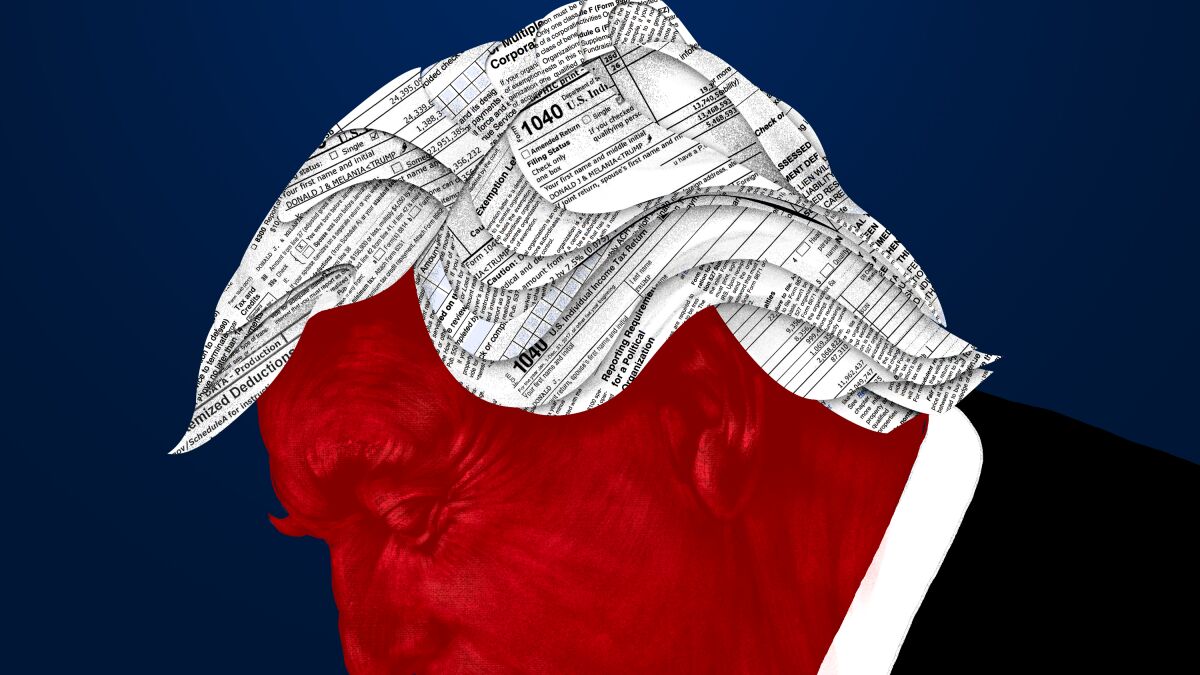Sunday Morning / April 18, 2023
The U.S. Justice Department charged the 45th President of the United States on Tuesday with 37 federal crimes including; willful retention of national defense information; conspiracy to obstruct justice; withholding a document of record; corruptly concealing a document or record; and false statements and representations. Each charge carries a $250,000 fine and prison sentence of 5-20 years. The Justice Department is seeking "a speedy trial on this matter consistent with the public interest” in the matter of the United States of America vs. Donald J. Trump.
While the defendant currently leads a crowded Republican contest in the U.S. Presidential Election 2024, Tuesday’s indictment triggered a surge of support for his cause. Over 75% of all Republicans believe the indictment is politically motivated, and while 35% (Always Trumpers) are offset by 10% (Never Trumpers) it appears the sentiment is coming from the remaining sweet spot of 55% (Maybe Trumpers). While indictments from Georgia and Washington are looming, the prospect of a former president facing four criminal trials in four separate jurisdictions while campaigning for president is without precedent in the republic.
Disgruntled by an FBI investigation into Donald Trump's handling of government documents, Republicans in the 118th Congress vowed to create the United States House Judiciary Select Subcommittee on the Weaponization of the Federal Government. It was established to investigate alleged abuses of federal authority, including collusion between federal agencies and the private sector with a simple question:
Does the United States federal government violate the civil liberties of American citizens for political purposes?The Espionage Act
The Espionage Act was passed just after the United States entered World War I in 1917. In his State of the Union address, President Woodrow Wilson invited Congress to consider the legislation:
There are citizens of the United States who have entered into conspiracies against the neutrality of the government. They have sought to pry into every confidential transaction of the Government in order to serve their own interests. Such creatures of passion, disloyalty, and anarchy must be crushed out.
In the spirit of that tradition, there have been precisely 299 heads of government including presidents, emperors and prime ministers around the world who’ve been charged, convicted, overthrown, incarcerated and assassinated by their own governments.
Forget about emperors in Rome, China and Russia or the Kings of England and France. We’re talking about modern-day heads of state, who, like their medieval forebears, are being charged everyday with corruption and incarcerated in modern republics.
The president of South Korea Park Geun-hye was sentenced to 25 years in prison for corruption in 2018, and Myanmar's de facto prime minister/Noble Peace Prize laureate Aung San Suu Kyi is serving 26 years via a military coup. Even French president Nicolas Sarkozy was sentenced to prison for corruption, and every single president in Peru but one between 1985 - 2018 has been arrested.
From the President to Taiwan to the Prime Minister of Pakistan, a combined 146 heads of government have been indicted on account of bribery, corruption, treason and crimes against humanity since 2000. Russia’s Vladimir Putin being the most recent when the ICC issued a warrant for his arrest.
Argentina's former president, Cristina Fernández de Kirchner, though convicted of fraud remains in office and out of prison because of immunity, whilst Honduran president, Juan Orlando Hernández, has been extradited to the U.S. and awaits trial for drug trafficking. Even Columbian former president Álvaro Uribe went from kingmaker to detainee when the Supreme Court ordered him to be placed under house arrest for bribery and corruption.
While the vast majority of the 299 Club all went quietly, only Brazil’s Luiz Inácio Lula da Silva made a comeback. While the vast majority of the world’s heads of government were brought down by a network of operatives within their own governments only Brazil's Lula — who returned to the presidency in January 2023 after spending 580 days in jail — turned the experience into a crusade, and if you’re betting on Trump or Biden in the 2024 read on. A surge of $2 million in campaign contributions flowed to Trump’s Super PAC “Save America” on Tuesday, demonstrating what P.T. Barnum of the Barnum and Bailey Circus often said and knew of sales. “Theres no such thing as bad publicity.” Presidential Records Act
After President Richard Nixon sought to destroy records relating to his presidential tenure in 1974, the Presidential Records Act was created in 1978. The law held that a president’s records aren’t private property, and clarified through statutes that presidential records are owned by the public.

Richard Nixon 1974
A year after leaving office, the National Archives and Records Administration (NARA) retrieve 15 boxes from the private residence of the former President Donald Trump in January 2022. Suspicious he's not complied with the Presidential Records Act, NARA informs the Justice Department and the Federal Bureau of Investigation (FBI) who begin a criminal investigation.
In August, an FBI raid at Mar-a-Lago seize and recover over 13,000 documents, 300+ of which are marked — Top Secret (25), "Secret" (92) "Confidential" (67) — but were the documents declassified, the private property of the former president, or a violation of The Espionage Act? To prove which, the Independent Special Council led by Jack Smith would need to pierce the attorney-client privilege of Donald J. Trump by deposing his personal attorney, Evan Corcoran.
A federal judge in Washington rules that Corcoran’s conversations with his client are not shielded by Attorney-Client Privilege — an iron clad confidentiality agreement between lawyers and their clients — if and when a client’s comments are made in furtherance of a crime. Called the Crime-Fraud exception, Corcoran’s forensic notes and voice recordings give the government a roadmap for prosecution.
Regarding the NARA's inquest, Corcoran transcribes his client saying:
• I don’t want anybody looking;
• I don’t want anybody looking through my boxes;
• I really don’t want you looking through my boxes;
• What happens if we just don’t respond at all, or don’t play ball with them;
• Wouldn’t it be better if we just told them we don’t have anything here;
• Isn’t it better if there are no documents?
William Barr, the former US Attorney General who served under Donald Trump, told CNN, “Trump is toast if allegations he mishandled classified documents are proven to be true.” Former national security advisors and former US prosecutors agree that the “DOJ will seek incarceration for Trump if convicted.” The trial is expected to get underway in Miami next year.
However, this article isn’t really about The Presidential Records Act > The Espionage Act, or even if or whether the former president tantalized his dinner guest at Bedminster with state secrets and battle plans. It refers in particular to DOJ guidelines that discourage all prosecutions that could foil or effect a federal election, and asks only if the occupants of the White House, past and present, had considered using the office to discourage FBI raids of former presidents, perp walks through Miami courtrooms, or a self-coup from the top in lieu of a free and fair election?Visibility Politics
Not only does visibility matter in politics, it’s a crucial asset, intrinsic constituent and crucial agent of politics. Lest it comes at the cost of virtue.
The Pew Research Center recently asked 17 advanced economies to highlight America’s international image. Admired for its tech and revered for its might, they all associated the nation with discrimination and the poor state of its democracy. To that end, a peek back at how Cicero won his election in Ancient Rome may serve as a cautionary tale for the current political climate.

Cicero BC 54
In 64 BC Marcus Cicero, Rome’s greatest orator, ran for Consul: the highest office in the Roman Republic. His practical brother, Quintus, decided he needed some no-nonsense advice on running a successful campaign, and in a short letter offered some timeless tidbits of political wisdom:
Remind voters about the sexual scandals of your opponent; Shroud their activities in controversy; Rehearse their ineptitudes publicly; Remain omnipresent before the people.
The humble art of personal politicking was dead-on (Cicero won) and is as relevant today it seems as when it was written. Sadly, Cicero was assassinated by Mark Antony who played a pivotal role in transforming the Roman Republic from a constitutional republic into the autocratic Roman Empire. Indeed, a great civilization is not conquered from without until it has destroyed itself from within.
For whence falls the coliseum; Rome shall fall; And when Rome falls—the World.








